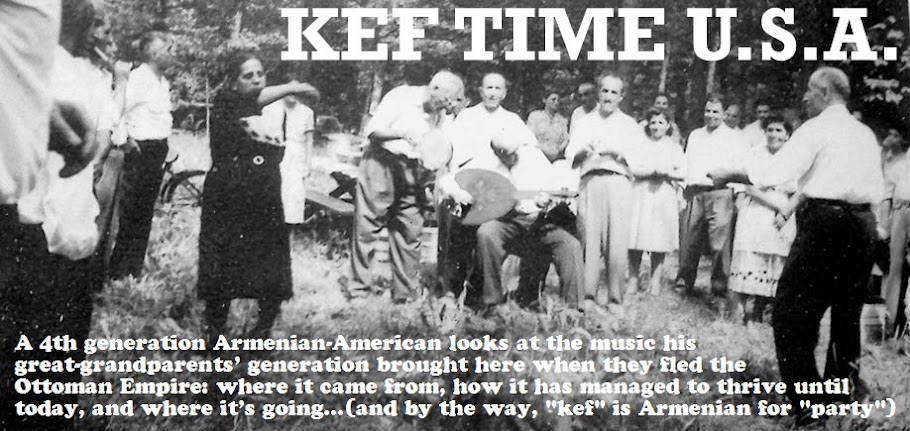For years, singer Onnik Dinkjian has been one of the biggest names in the Armenian-American kef scene. Born in Paris in 1929, and living in America since 1946, Onnik might be the oldest active kef musician today but his energy still outpaces many of his younger peers. Personally, I last saw him sing at AYF Olympics in Detroit last September and in the words of my generation, he "killed it." Both Onnik and oudist son Ara's careers have been profiled elsewhere and I will get straight to the point of my post.
Onnik's latest production, "Diyarbekiri Hokin" (The Soul Of Diyarbekir [Dikranagerd]), is truly a landmark album in our music. I knew that a recording specifically of Dikranagerdtsi folk music was in the works, and that fact in itself was notable, as far as I was concerned. But I didn't anticipate how great the album would actually turn out!!! From the first listen I couldn't believe my ears. Onnik, and son Ara who led the ensemble on oud and did most of arrangements along with Istanbul-Armenian guitarist Ari Hergel, managed to create an album that was as traditional as you could possibly get in this day and age, yet sounded fresh, alive, vibrant. Musician friends around the country agreed with me that this album was something special. Opening with a traditional Diyarbakir Peshrev, the audience is kept waiting for Onnik's vocals but enjoys this expertly played Near Eastern classical piece: https://www.youtube.com/watch?v=qNFFA9gYIfg, setting the mood for the album you are about to hear. Best enjoyed with a bottle of arak, mezza, and good friends, this is not your typical "kef" dance album, but a real work of art.
The instrumentation and songs are completely traditional but the arrangements at times were very modern, especially in the background rhythm section. On the intro to a few of the songs you hear some modern guitar playing and percussion that then leads into a traditional kef song. But even the typical kef songs were made fresh and new by Onnik's interpretation. For example, on the every popular song "Kale Kale" (i.e. Hayde Kale) Onnik sings not like he's at a kef belting out lyrics, but gently, as if he's in his backyard singing to his wife or perhaps granddaughter. Of course, this understated style was always what has set Onnik apart from his fellow kef singers and earned him the name of "the Armenian Frank Sinatra." This song in particular was a highlight for me and one feels you can actually hear Onnik smile as he sings the lyrics.
https://www.youtube.com/watch?v=CE4Cthhw2Ms
 |
| ARA AND ONNIK |
In correspondence with Ara, he told me that his intention with the project was "to reclaim Armenians' historical presence in Dikranagerd". To this end, many songs from Dikranagerd that previously have been sung in both Kurdish and Turkish (by Armenians as well as Turks and Kurds) were sung with lyrics written mostly in Diyarbakir Armenian dialect by Onnik, or lyrics taken from Dikranagerdsi Armenian poetry or folk songs. Devoted kef music fans will note the song "Liberde" recorded by John Berberian with Robert Afarian on vocals, done here as "Siranoush." The instrumentation seems to have been chosen with the same idea in mind, taking us back to the Diyarbakir that could have been if 1915 had never happened. Notably, the producer of the album, Aytekin Ataş, who FUNDED the entire project is a Kurd from Turkey. If you have been following Armenian current events, you know the now Kurdish-run municipality of Diyarbakir gave the historic St. Giragos Church back to the Armenian community, the first return of a historic Armenian church to ever take place since 1915 (see http://armenianweekly.com/2011/10/25/mouradian-armenians-locals-in-diyarbakir-send-powerful-message/) (Onnik mentions the St. Giragos church in his Diyarbakir monologues on the album.) Aytekin, like the leaders of the Diyarbakir municipality, is one of a growing number of Kurds who have embraced the Armenian cause (which as Ara reminded me, is really a human cause), sometimes putting themselves at risk for doing so. Not only Kurds, but Turks as well, as the ensemble on this recording, aside from Onnik, Ara, Ari, and Greek kemence player Socratis Sinopoulos, were to my knowledge mostly Turks. Quite impressive. As Onnik is quoted in the liner notes: "See, we are very happy together. If 1915 had never happened; we could have been brothers and sisters, relatives, neighbors and we could have lived on the same land all together."
 |
| ARMENIAN KANUN AND VIOLIN PLAYERS IN DIKRANAGERD BEFORE 1915 |
 |
| HOVSEP SHAMLIAN |
And then there are the songs Onnik has written, mostly episodes from his life. The second track, where we hear Onnik sing for the first time, was written by Onnik to a Diyabakir folk melody. The lyrics in Western Armenian paint a picture of Onnik's mother Zora who tragically passed when Onnik was five. Her voice was legendary among the Dikranagerd Armenians of Paris, who, as the song depicts, would come and sit on the floor, eagerly waiting to hear her sing the songs of their homeland. Onnik dedicated the album to his mother Zora, and this tribute to his mother who I'm sure was a huge influence on his pursuit of Armenian music, seemed like a great way to open this album of songs, some of which she probably sang herself.
It seems like a good way to end this review, too. If you haven't yet, get Onnik Dinkjian's "Diyarbekiri Hokin" on iTunes, Amazon, Spotify, or however else you get music!!! You won't regret it.
http://www.amazon.com/gp/product/B00UNY6EVM/ref=dm_ws_sp_ps_dp
https://itunes.apple.com/us/album/diyarbekiri-hokin-ermenice/id976619931
http://www.amazon.com/gp/product/B00UNY6EVM/ref=dm_ws_sp_ps_dp
https://itunes.apple.com/us/album/diyarbekiri-hokin-ermenice/id976619931

